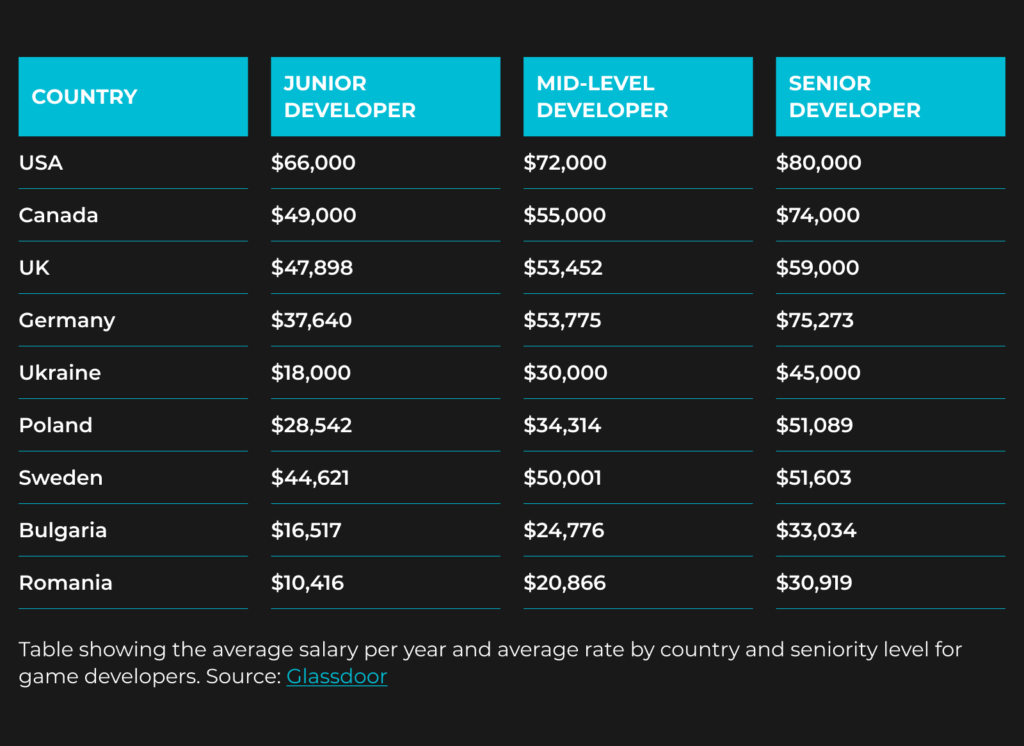Average Game Developers Salary: Comprehensive Analysis for Business
During the tumultuous 2007 financial crisis, as individuals sought solace within the captivating realm of gaming, a remarkable resilience emerged in both game sales, the demand for jobs, and game developers salary. Fast forward to the present, the global gaming market continues to boom and is projected to reach a staggering $305 billion by 2025. These trends solidify the industry’s unwavering growth trajectory — even in the face of the impending Q4 2022/Q1 2023 recession.

Fueling this unstoppable momentum are groundbreaking advancements like cloud gaming, virtual reality, and the seamless integration of artificial intelligence. As a result, the demand for highly skilled developers is also skyrocketing, ushering in a new era of immense opportunities. But are these developments impacting game developers’ salaries as well?
In this all-encompassing article, we delve into the pivotal question: “How much do game developers make?” Furthermore, we unravel the intricate web of factors that contribute to the varying compensations, equipping you with up-to-date trends and invaluable insights. With this knowledge By arming you’ll know whether to consider mobile gaming outsourcing or outstaffing as you navigate the dynamic landscape of the gaming industry.
Average Game Developer Salary per Year
The average game developer’s salary per year can vary depending on factors like experience, location, and company size. The table below shows the salaries for different countries and seniority levels.

The annual average salary for a game developer in the United States is $91,009. While the salaries usually range between $64,000 and $127,000 in the 2023 year, with an average hourly rate of $43.75 per hour, rates in European countries like Ukraine are more affordable, ranging from $48,000 and $74,400, boasting some of the lowest taxes in Europe.
What Tasks Can a Game Developer Solve for Your Project?
Game developers play essential roles and handle critical tasks in making your idea a successful reality. Some of these tasks include:
Programming
They work closely with game engineers, employing codes and programming languages to write the underlying code that makes your game work as intended. They implement the play mechanics, handle player input, manage physics simulations, and incorporate artificial intelligence to optimize performance and resolve technical challenges.
Testing and debugging
Developers playtest the game, searching for bugs, glitches, and other errors. They also analyze gameplay balance and consider player feedback to fine-tune the mechanics and provide a smooth and enjoyable gaming experience.
Platform compatibility
They optimize the game to function smoothly across various hardware configurations, computer sizes, and operating systems. This involves adapting the user interface, adjusting graphical settings, and optimizing performance to maintain a consistent experience.
Multiplayer and network integration
If your game should feature multiplayer or online capabilities, game developers handle the networking aspects. For example, they create a seamless and fair multiplayer experience by arranging the necessary infrastructure, developing matchmaking systems, and ensuring player actions are synchronized across the network.
Game Developers’ Salary Depending on Experience and Skills
The answer to how much do game developers earn is often dependent on skill levels and expertise in specific tech stacks. Let’s compare how salaries can be determined by position, skills, and experience:
Proficiency in Popular Game Development Languages
Game developers highly skilled in C++, a widely used language in the game industry, often earn higher salaries. Its performance and prevalence make it a sought-after skill. On the other hand, entry-level developers or those proficient in C# or Python, which are also commonly used, may have slightly lower salary expectations than C++ experts. However, they are still in demand and can secure competitive salaries.
Knowledge of Game Engines
With experience in using popular engines like Unity or Unreal Engine, game developers often have higher game dev salary expectations. These engines offer powerful tools and streamlined workflows, so expertise in utilizing them brings value to projects.
Cross-platform Development
Skills in cross-platform development – enabling games to run on multiple platforms – may be advantageous in game developers salary negotiations. That ability optimizes games for different platforms, giving your project a wider audience reach.
Augmented Reality (AR) and Virtual Reality (VR) Development
Given the rising popularity of AR and VR technologies, game developers with expertise in creating immersive experiences in these domains can expect higher salary expectations. Their skills in designing and developing immersive environments for AR/VR platforms offer unique and captivating gameplay experiences.
Interestingly, these gaming dev salaries are not set in stone and can be influenced by location, demand, company size, individual negotiation skills, and a game developer’s overall experience and contributions.
As with any other career, you get paid more as you garner experience and handle more significant responsibilities. According to the “Game Dev” report created by enterthecode.pl, entry-level professionals can expect to earn between PLN 4,500 and PLN 7,000 gross. As your skills increase or you are promoted to a position requiring more experience, you can earn between $1,682 and $2,103 gross. For senior positions and other more unusual positions, you can earn much more. A Unity developer can expect an earning range of $4,942 to $7,886 gross per month.
Read more about the 7 Steps for Building Your Dream Game Development Team
Why Game Developer Salaries Depend on the Country
Here are some factors that affect the gaming developer salary in different countries:
Cost of Living
The cost of living varies by country, so countries with higher living costs often offer higher salaries to meet the expenses of their residents. Similarly, countries with lower costs of living may have lower salary expectations.
Economic Factors
Countries with strong economies and higher per capita income often offer higher salaries across various professions, including game development. On the other hand, countries with weaker economies may have lower salary ranges.
Demand and Supply
The demand for game developers can differ based on the size and growth of the local game development industry. Countries with a robust development sector and high demand for skilled professionals may offer higher salaries to attract and retain talent. In contrast, the opposite is true for countries with a smaller game development industry and limited market.
Government Policies and Regulations
Government policies and regulations related to labor, taxation, and employment can impact game developer salaries. Higher tax rates or stricter labor laws may lower game developers’ salaries, affecting their overall salary expectations
How Not to Overpay Game Developers and Get a Quality Result
To achieve a quality result without overpaying game developers, consider the following strategies:
Clearly define project requirements
Before engaging with developers, outline your project’s scope, features, and desired outcomes. This ensures developers understand the project’s complexity and allows for accurate cost estimation.
Research market rates
Familiarize yourself with industry standards and market rates for game development team roles in your location. This knowledge provides a benchmark for negotiating fair prices and helps avoid overpayment.
Evaluate portfolios and previous experience
Look for projects that align with your game’s requirements and find top-notch developers who have successfully delivered similar projects, as they are more likely to provide quality results within your budget. Before finalizing your decision, seek recommendations or references from other clients who have worked with the developers you are considering. Their feedback provides valuable insights into the developers’ performance, reliability, and ability to deliver quality results.
Request detailed proposals
Ask developers to provide detailed proposals outlining their approach, timelines, milestones, and cost breakdowns. This allows for a comparison of multiple proposals and helps assess the top values they offer relating to their quoted price.
Create a comprehensive contract
Develop a detailed contract outlining the project scope, monthly deliverables, payment terms, timelines, and other relevant terms and conditions. A well-defined contract protects both parties’ interests and helps prevent misunderstandings or disputes.
Establish clear communication and expectations
Maintain clear communication channels with developers and ensure you effectively communicate expectations regarding deliverables, timelines, and quality from the beginning. Regular communication and feedback throughout the development process promote transparency and keep the project on track.
What Will You Win When Hire Game Developers with Newxel?
Newxel offers access to a highly skilled talent pool of meticulously selected individuals for their expertise and proficiency. The partnership enables flexibility in hiring, ensuring that you can scale the team to adapt to the project’s evolving needs. This allows for efficient resource allocation and optimal project management.
The streamlined recruitment process Newxel reduces the time and effort typically associated with assembling a skilled team. So, the pre-vetted professionals seamlessly integrate into the project, ensuring quick progress while maintaining high-quality standards.
Leveraging Newxel’s talent pool lets you avoid hefty investments in infrastructure and employee benefits for development projects. This money-saving approach maximizes resource allocation and supports the long-term financial sustainability of the project. And, with Newxel’s mobile game outstaffing services, you have a faster and efficient recruitment process, and your game development team is easy to scale up.
Conclusion
The average game developer salary depends on various factors, including skill set, experience level, geographical location, and the company’s financial resources. By assessing market rates, recognizing the value that developers bring to the business, and building a supportive work relationship with a reliable company, you can ensure that game developers are adequately rewarded for their game development services as your company thrives in the ever-evolving game development industry.







